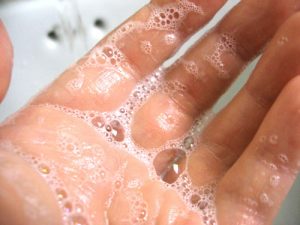06
Sep
FDA Bans Antibacterial Pesticide Triclosan in Soaps, While EPA Allows Its Use in Common Household Products and Toys
(Beyond Pesticides, September 6, 2016) “The Food and Drug Administration (FDA) decision today to remove the antibacterial triclosan, found in liquid soaps (toothpaste use will remain), is a long time coming,” Jay Feldman, Executive Director of Beyond Pesticides, said today. He continued: “The agency’s failure to regulate triclosan for near two decades, as the law requires, put millions of people and the environment at unnecessary risk to toxic effects and elevated risk to other bacterial diseases. Now, FDA should remove it from toothpaste and EPA should immediately ban it from common household products from plastics to textiles.” Many companies had decided under consumer pressure to remove triclosan from its liquid soap products years ahead of the FDA decision today.
FDA’s announcement today indicates that soaps containing  the antibacterial ingredient triclosan do not have substantiated germ-killing health benefits. Beyond Pesticides raised concerns about the health effects of triclosan in 2004 in its piece The Ubiquitous Triclosan, and petitioned the agency to ban the chemical in 2005. In 2015, triclosan was banned in the European Union. For nearly two decades, scientific studies have disputed the need for the chemical and linked its widespread use to health and environmental effects and the development of stronger bacteria that are increasingly difficult to control. The chemical offers no more health protection than soap and water, according to studies. In fact, triclosan contributes to antibiotic resistance, which has become an international public health threat.
the antibacterial ingredient triclosan do not have substantiated germ-killing health benefits. Beyond Pesticides raised concerns about the health effects of triclosan in 2004 in its piece The Ubiquitous Triclosan, and petitioned the agency to ban the chemical in 2005. In 2015, triclosan was banned in the European Union. For nearly two decades, scientific studies have disputed the need for the chemical and linked its widespread use to health and environmental effects and the development of stronger bacteria that are increasingly difficult to control. The chemical offers no more health protection than soap and water, according to studies. In fact, triclosan contributes to antibiotic resistance, which has become an international public health threat.
Meanwhile, the Environmental Protection Agency (EPA), which has jurisdiction over household products containing triclosan (microban), continues to allow the use of this hazardous chemical in numerous plastic and textile products, from toys, cutting boards, hair brushes, sponges, computer keyboards to socks and undergarments. In 2015, EPA issued a long-waited response to a Citizen Petition filed by Beyond Pesticides and Food and Water Watch in 2010, denying the organizations’ request to cancel registered products that contain the antibacterial pesticide. The agency did, however, grant one request, and will evaluate and conduct a biological assessment of the potential for effects on listed species under the Endangered Species Act (ESA) in the ongoing triclosan registration review.
Triclosan has been linked to hormone disrupting effects, bacterial and antibiotic resistance, and impacts on aquatic organisms. The Centers for Disease Control and Prevention has found that 75% of the U.S. population contain triclosan in their bodies. Triclosan enters the food chain through use of contaminated water or fertilizer on agricultural crops.
For background, see Beyond Pesticides’ triclosan page.










